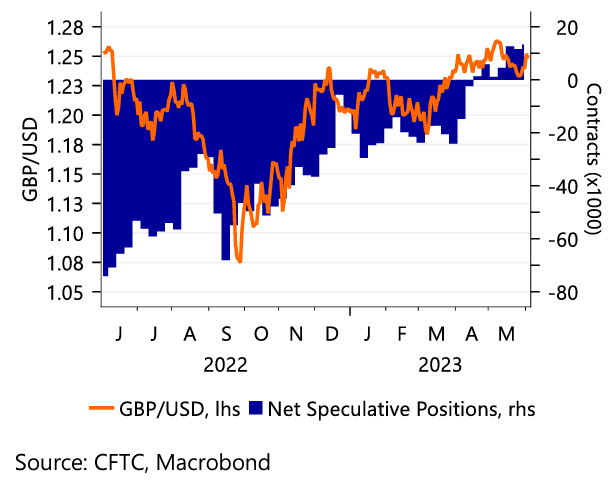Pound Sterling Unwinds Overbought Conditions
- Written by: Gary Howes
-

Image © Adobe Images
The British Pound started the new week on a soft footing and has fallen against the majority of G10 counterparts but strategists at Goldman Sachs and other analysts say the UK currency can continue to outperform.
In fact, the widespread declines by Pound Sterling look to be a retracement of some of last week's dominance: it was a strong week for the UK currency that included a 1.0% advance against the Euro making for the biggest weekly advance since February.
Meanwhile, looking at pairs such as GBPNZD reveals the need for a correction from overbought territory, a theme that could dominate across the Sterling strip this week.
"Sterling is falling prey to profit taking," says Mathias Van der Jeugt, an analyst at KBC Bank, referring to the recent performance of the Pound to Euro exchange rate (GBPEUR).
GBPEUR has retraced some of its recent gains this week as it retreats 0.22% on Monday to 1.16, having reached a high of 1.1670 last Thursday.
Sterling meanwhile rallied 0.80% against the Dollar last week, a gain that would have been larger were it not for the unexpectedly strong U.S. jobs report released Friday that prompted a sharp retracement.
The Pound to Dollar exchange rate (GBPUSD) retreated a further third of a per cent to 1.24 on Monday, extending Friday's 0.60% loss. "GBP/USD has fallen further below 1.25, while the pound has also slipped against the euro but the pair is still holding close to its high for the year," says Nikesh Sawjani, an economist at Lloyds Bank.
The Pound remains one of 2023's best-performing currencies, held aloft by expectations for further interest rate hikes from the Bank of England, an expectation that keeps UK bond yields elevated relative to those in other key trading partners.
Analysts say 'carry' - the favouring of currencies where bond yields are highest - remains highly relevant for currency markets in 2023, and on this count the Pound is well supported.
"Sterling continues to perform well. Markets have scaled back some of the aggressive (110bp) tightening priced in for this year, but not by much," says Chris Turner, head of FX research at ING Bank.
Above: "Net GBP speculators' positions have now been positive for seven consecutive weeks. This marks a notable improvement in sentiment relative to the start of the year" - Rabobank.
Money markets show investors are pricing close to 100bp of tightening this year and these expectations are elevated relative to those of the European Central Bank, allowing GBPEUR above 1.1630.
"Sterling now looks like a decent intra-European target currency for the carry trade," says Turner.
ING says it expects EURGBP to "drift to the 0.8550 area," a level that equates with a GBPEUR target of 1.17.
Strategists at Goldman Sachs say that although the Bank of England has remained "a reluctant hiker", the sharp upside in inflation and the "only gradual rebalancing in labour demand" seems likely to push them (again) towards further policy tightening.
Goldman Sachs economists recently raised their terminal Bank Rate forecast to 5.25% in September (vs. 5% in August), implying another three 25bp hikes ahead.
Economists also note that the BoE faces a less challenging trade-off now that energy prices have decreased sharply.
"This has naturally transitioned Sterling from a negative outlier to a positive one—in addition to other headwinds from last year that have now turned to tailwinds—and we think that can persist for a while longer as UK policymakers have relatively more work to do under our economists’ forecasts," says a weekly note from Goldman Sachs' currency strategy team.
They acknowledge other factors matter for the Pound, particularly broader global risk sentiment, "and if markets take further relief from a more cautious Fed, GBP should also benefit vs USD and EUR."
Goldman Sachs says their trade recommendation to sell the Euro against the Pound has reached its target (EUR/GBP is now trading near an initial target of 0.86).
"We are closing our short EUR/GBP trade recommendation for a potential profit of roughly 1.5%, but we will be looking for opportunities to reengage," says Goldman Sachs.
In early May analysts at Goldman Sachs upgraded their tactical stance on the British Pound to "outright constructive" amidst a surprising UK economic resilience and fading central bank divergence risks.
"We have been arguing for some time that Sterling's fundamentals have improved, and markets were not fully appreciating that," said Kamakshya Trivedi, Head of Global FX at Goldman Sachs.
In February, Goldman Sachs recommended taking profits on Sterling shorts, arguing at the time that the UK currency should no longer underperform on the 'crosses' (non-USD exchange rates).
The move was an effective upgrade of the Pound from underweight to neutral.
"We are now taking an outright constructive stance," said Trivedi in early May.


